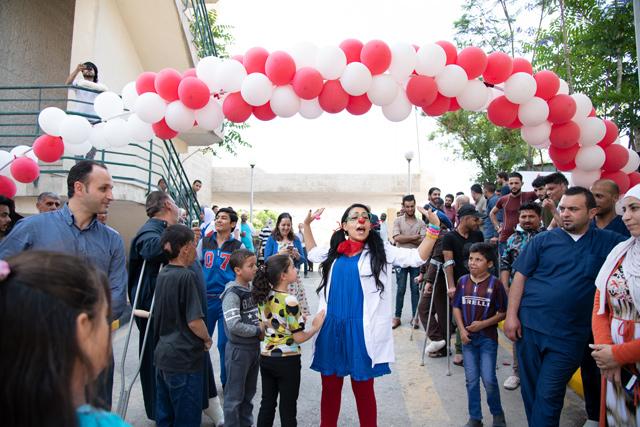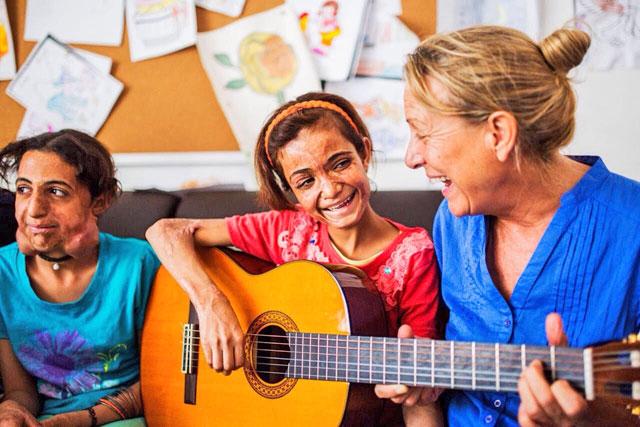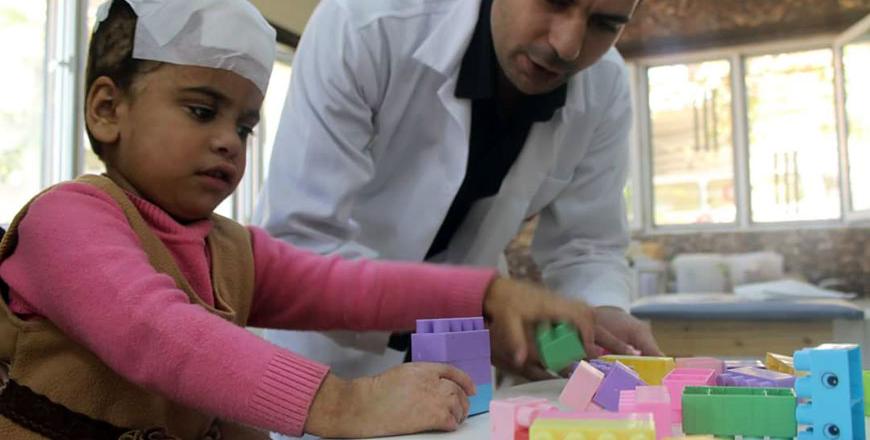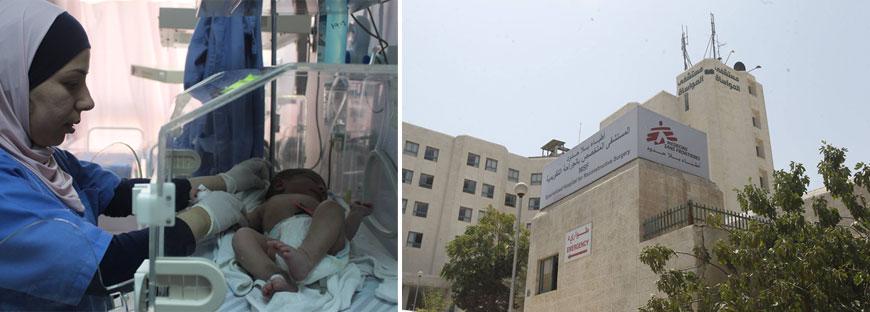You are here
War-wounded survivors get second chance at life at MSF reconstructive surgery hospital
By Camille Dupire - Apr 30,2018 - Last updated at Apr 30,2018

Patients from war-torn countries learn how to regain a sense of normality at the MSF reconstructive surgery hospital in Amman (Photo courtesy of Medecins Sans Frontieres)
MARKA — Victims of regional conflicts have been Medecins Sans Frontieres (MSF) Amman Reconstructive Surgery Hospital, where teams of surgeons help them regain a chance at life.
Nahla Fadel, a patient from Iraq, arrived in 2013 and underwent 24 surgeries at the facility. "When I arrived, the mobility of my severely burned hands was so limited that I couldn't comb the hair of my child or even feed him," she recalled, adding that "now, after two years of surgeries with MSF, my hand mobility is almost back to normal".
Nahla is one of the 4,745 patients who have been admitted to the facility specialising in war wounds caused by bomb blasts, bullets, shrapnel and burns, which has performed over 11,500 surgeries since its opening in 2006.
Regaining sense of normality
The reconstructive surgery hospital on Monday inaugurated a new social and recreational area aimed at providing a safe and easily accessible recreational space for men, women and children patients to socialise.
“We believe this space will both improve the patients’ physical safety and expand the holistic care MSF strives to provide to our war-wounded patients from across the Middle East,” said Deputy Head of MSF Mission in Jordan Anneliese Coury.
The inauguration ceremony, which included a show by the International Red Noses and a local artist who designed wall paintings to beautify the area, witnessed the attendance of the private donor Fehmi Hannachi, MSF representatives and patients.
The area, which includes a playground, a classroom for young patients, a private space dedicated to women and a common social area, was built in coordination with the physiotherapy and psychosocial department as well as the patients themselves, who shared their expectations through group discussions.
“This area will be used for physiotherapy exercises and occupational activities such as games and gardening, while educational and recreational activities will be available for children who represent 20 per cent of our patients, all the while taking into account all physical disabilities [and] differences in gender, age and origin,” Maria Al Fadel, the hospital’s communication officer told The Jordan Times.
“The creation of the social and recreational area is a great opportunity for us to launch a new dynamic within the hospital which should help us improve the quality of our services for the benefit of our patients. Having this outdoor area is a crucial improvement in the quality of their stays,” Coury highlighted.
Growing need
amidst regional crises
The Reconstructive Surgery Programme (RSP) was established in 2006 to offer orthopedic, maxillofacial and plastic surgery, as well as physiotherapy and psychosocial support to victims of war and violence from Middle Eastern countries.
“When we initially opened this hospital, nobody thought we were going to stay 10 years,” recalled Marc Schakal, MSF head of mission for RSP, adding, “but, after over 11,500 surgical interventions, it is clear that we have work for the next 10 years, and one hospital is not enough”.
The programme, according to Schakal, was established after victims of war in Iraq were unable to access the necessary medical attention needed, and has continued due to ongoing conflicts in the region and the lack of appropriate healthcare facilities in war-torn countries.
"While they may receive initial care for their wounds, our patients do not usually have access to such specialised surgical procedures in their home countries, which are mostly at war," said head surgeon Dr Ashraf Al Bostanji, adding, "these hard-to-reach services include orthopedic, maxillofacial and plastic reconstructive surgery, which we provide at no cost to the patients and lower running costs than the private sector."
Renewed hope
Four-year-old Ibrahim was finally able to open his mouth for the first time in two years, after undergoing multiple rounds of maxillofacial and plastic surgery, said Sajdi, who has been working with him on mouth opening and scar healing techniques at the hospital.
In May 2015, Ibrahim’s family fled bombing in Yemen’s Sanaa, seeking refuge in his grandmother’s house outside the capital. There, Ibrahim drank from a bottle of drain cleaner, which burnt his mouth and fused his lips together, leaving him unable to open his mouth, speak or chew food.
“We use different creative approaches adapted to Ibrahim’s young age, such as teeth brushing, singing or screaming exercises. We also ask him to do inside-mouth massages for himself so he feels like it’s a game. Basically, we try to create an atmosphere for him to be able to conduct the exercises on his own and benefit from them,” he said, as Ibrahim, who is now able to pronounce full words, gave him a thankful hug after an exercise.
State of the art facility
RSP aims to become a global leader in reconstructive orthopedic, plastic and maxillofacial surgery, a national and international referral centre and a training and research hub to develop and document knowledge and innovation in reconstructive surgery, according to MSF website.
"The surgical techniques adopted in this project are world-class," Al Bostanji said, citing microsurgeries which involve free flaps, nerve grafting and hand surgery. “What makes this project stand out is implementing such a high level of technical expertise for war victims in the humanitarian medical field," he pointed out.
First established in 2006 to care for victims of war in Iraq, the MSF facility later expanded to receive patients from Iraq, Gaza, Yemen and Syria, in addition to a mother and healthcare project in Irbid and an emergency trauma project in Ramtha, close to the Syrian border.
MSF also runs clinics in Irbid for non-communicable diseases and a step-down unit in Zaatari camp for Syrian refugees, according to its website.
Related Articles
AMMAN — Médecins Sans Frontières/Doctors without Borders (MSF) is launching a photo exhibition on Tuesday that aims to share the organ
AMMAN — Hanan from Iraq and Najwa from Gaza now call themselves “neighbours”, as their rooms at the new Médecins Sans Frontières (MSF) Hospi
AMMAN — Médecins Sans Frontières (MSF) eyes further official Jordanian facilitation for the process of cross-border aid supply to hospitals



















